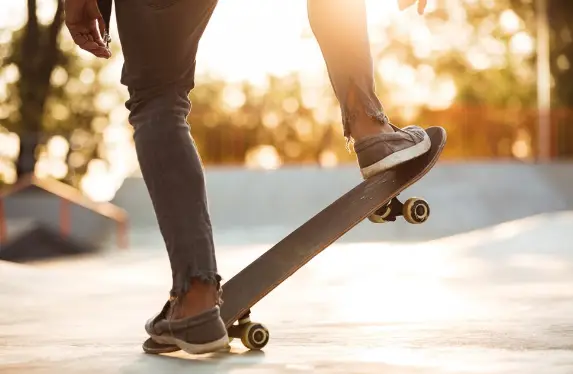Skateboarding, a pastime that was once was associated with streets, parks and rebellion, has been recognized as a sport at the Summer Olympics. The introduction of Olympic skateboarding has created an entirely new realm for both fans and athletes by combining athleticism, the latest fashions, creativity and unbelievable ability. What happened to skateboarding when it moved from the street to the Olympic arena? Let’s look at it!
What is Olympic Skateboarding?
Skateboarding is a form of sport in which athletes execute stunts and tricks using skateboards. The tricks range from spins and flips to grinds and slides which are all done on ramps, rails, or other obstructions. When it comes to the Olympics the focus is on two major events: Street Skateboarding and Park Skateboarding.
-
Street Skateboarding The event is held on a track made to mimic an urban street complete with railings, stairs, ramps, and curbs. Consider it as skating through a city jungle in which skaters make use of the surroundings to perfect their tricks.
-
Park Skateboarding: Skaters are competing on a massive bowl-shaped ramp, also known as”skatepark. “skatepark.” The skaters use the smooth curvatures as well as the sandstone walls to speed up and do tricks. It’s similar to skating in the middle of a huge pool. their goal is to display their abilities while keeping the control and elegance.
Why Skateboarding in the Olympics?
The skateboarding’s Olympic debut in the year 2020 changed the game. Since the beginning, skateboarding been viewed as a subculture, a part of the punk, surf, and street scenes. As the sport gained popular, more individuals recognized it as a legitimate sporting sport.
The inclusion of skateboarding at the Olympics allowed the sport to be seen on an international stage that allowed skaters from around the world to display their skills. Also, skateboarding was able to be viewed in a different way: as a blend of creativity, athleticism and art. Olympic skateboarding gives a feeling of authenticity and excitement for the sport, and has inspired the next generations of sportspeople.
The Impact on Skateboarding Culture
The inclusion of skateboarding of the Olympics was not just about bringing something new to the Olympics, it was also the result of bringing fresh and distinctive spirit into this year’s Summer Olympics. Traditions of Olympic games are usually built on established rules and regulations, however skateboarding celebrates personal expression, creativity and aesthetics.
Every skater’s performance at the Olympics isn’t just performing technical feats. It’s also about personal sense of style, how they can adapt the sport to their personal. Skateboarding during the Olympics allowed athletes to mix their individual fashion with their athleticism, creating a sport that was more exciting to watch.
Who Can Compete in Olympic Skateboarding?
One of the most exciting features of Olympic skating is that anybody who has the proper skills is able to participate. It’s not necessary to be born in a particular nation or have a particular background. Skateboarding is available to all athletes around the world, which makes event extremely diverse. In the 2020 Tokyo Olympics We saw a variety of skaters from various countries, age groups, and backgrounds. This proved that skateboarding is a sport for all.
Skateboarding can also be a popular choice for youngsters, with the majority of the best skaters are teens. Actually, at the 2020 Games, Sky Brown 13 years old of Great Britain, became one of the youngest Olympians ever to earn the medal in skating. This has created the interest of youngsters, urging youngsters to take up skateboards to pursue their Olympic goals.
Skate boarding’s Global Appeal
Since it’s Olympic debut skating has received greater international attention. Skaters from countries such as Brazil and in the United States, Japan, and some countries that were not previously recognized for their skateboarding have been creating their presence on international stage. The Olympics are helping spread the cult of skateboarding into other parts of the world and have created a more welcoming and varied skateboarding community.
The Future of Olympic Skateboarding
If we look ahead, Olympic skateboarding has a promising prospects. It is growing by attracting fresh talent as well as fans year after year. As skateboarding continues to evolve it is possible to expect more creativity, with skaters continually pushing the limits of what is possible with the skateboard.
The introduction of skateboarding into the Olympics is also opening the way for more “extreme” sports, like surfing, and BMX cycling, which could be explored for future Olympic Games. The trend indicates that the Olympics are changing to include an array of activities that are a reflection of the current lifestyle and interests of the younger generation.
Why It Matters
Skateboarding’s inclusion in the Olympics isn’t only a win to skaters. It’s a win also for all sports enthusiasts. The sport is ever-changing, and there’s room for imagination as well as individuality in the simplest of occasions. In bringing skateboarding into the Olympics We’ve seen the dawn of a new age of sporting sport that is a celebration of individual expressiveness as much as proficiency and skill.
It doesn’t matter if you’re avid skateboarder for years or you’re only just starting to learn about this sport it’s clear that the Olympics have opened the way to an entire new realm of exciting performances and inspirational athletes. Skateboarding has earned its spot in the Olympic stage and we’re eager to find out where this next chapter will take the sport.
Also Read: Longest Tennis Match: A Test of Endurance and Willpower
For more engaging content and the latest updates, follow Bunkknot for insightful articles and fresh perspectives!
Also follow: mastodon.social/@bunkknot


